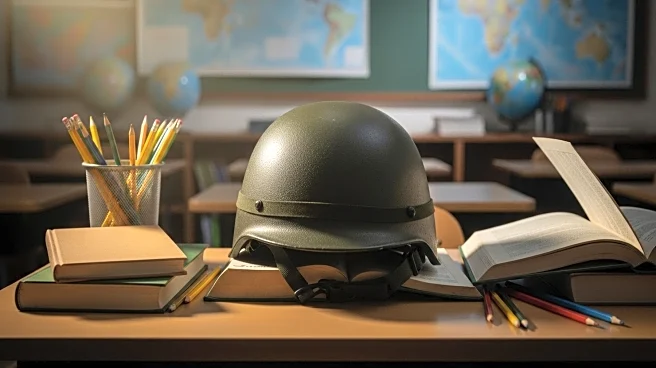What's Happening?
In occupied regions of Ukraine, the Russian military has initiated a program of militarized education for schoolchildren. On September 1, 2025, children in these areas began the school year with activities designed to instill Russian patriotism and prepare them for potential military involvement. This initiative is part of a broader strategy by Russia to reshape local identities and foster loyalty to Moscow. The program includes teaching hand-to-hand combat and special forces techniques, with the aim of preparing students for future roles in military formations. The Russian Defense Ministry established the Young Army movement in 2016 to promote patriotic education among children as young as eight, encouraging them to eventually join the Kremlin's armed forces. This approach has been criticized for violating international humanitarian law, specifically the Geneva Convention on the Protection of Civilian Persons in Time of War.
Why It's Important?
The militarization of education in occupied Ukrainian territories represents a significant escalation in Russia's efforts to consolidate control and influence over these regions. By indoctrinating young students, Russia aims to secure long-term loyalty and support for its regime, potentially creating a generation of individuals who view war as an inevitable part of their future. This strategy not only impacts the immediate educational environment but also poses long-term challenges for Ukraine's sovereignty and cultural identity. The compulsory nature of this education means that Ukrainian children are being systematically exposed to Russian propaganda, which could have lasting effects on their perceptions and beliefs. Additionally, the recognition of educational certificates only within Russia limits future opportunities for these students, effectively binding them to the Russian education system.
What's Next?
The continuation of this militarized education program is likely to provoke further international condemnation and calls for action against Russia's occupation policies. Ukrainian authorities and international organizations may seek to address these violations through diplomatic channels or legal avenues. The situation also raises concerns about the future integration of these children into Ukrainian society, should the territories be liberated. Efforts to counteract the Russian narrative and provide alternative educational resources could become a priority for Ukraine and its allies. Monitoring the impact of this program on the occupied regions will be crucial in assessing the broader implications for regional stability and security.
Beyond the Headlines
The ethical implications of militarizing education in occupied territories are profound, as it involves the manipulation of young minds to serve political and military objectives. This approach not only contravenes international law but also raises questions about the long-term psychological effects on children exposed to such indoctrination. The cultural dimension of this strategy highlights Russia's attempt to erase Ukrainian identity and replace it with a narrative that supports its geopolitical ambitions. The use of education as a tool for occupation underscores the complex interplay between military strategy and cultural warfare, with potential repercussions for future generations in the region.









